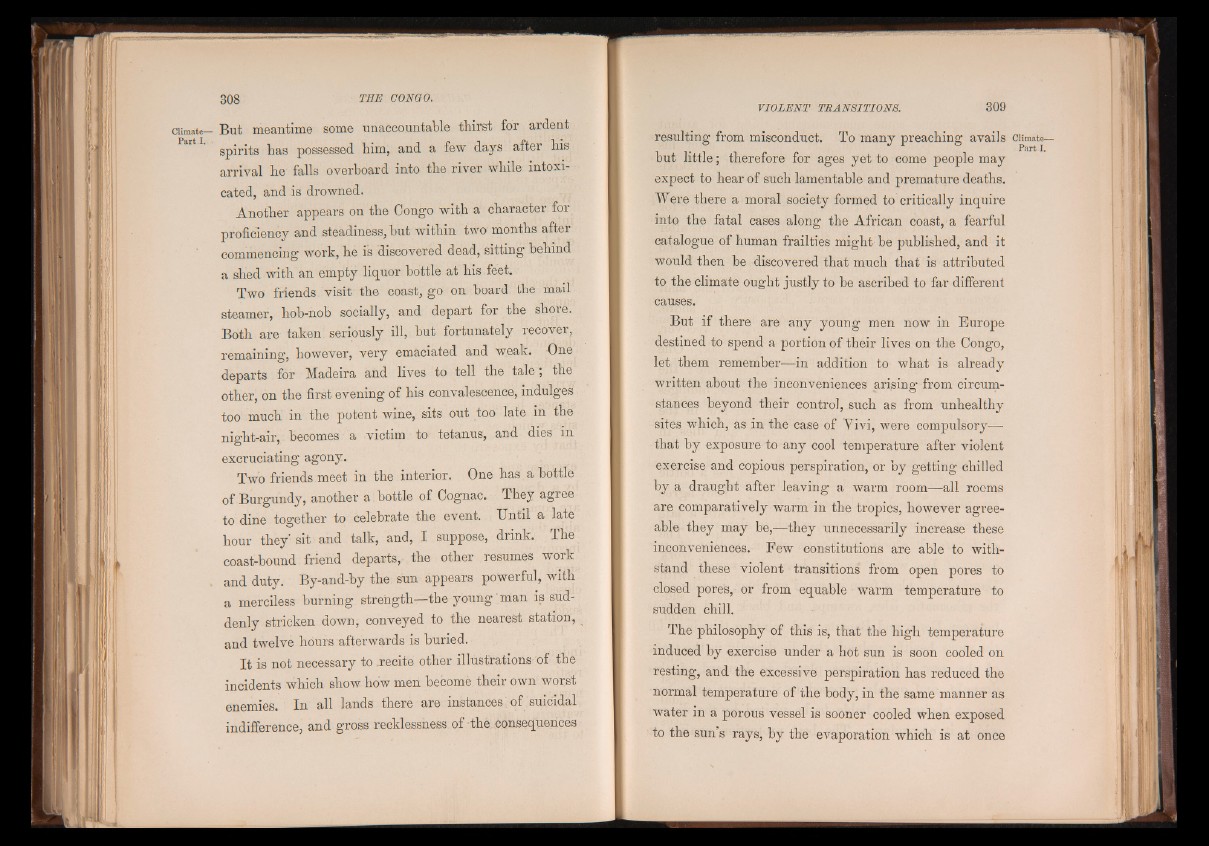
But meantime some unaccountable thirst for ardent
spirits has possessed him, and a few days after his
arrival he falls overboard into the river while intoxicated,
and is drowned.
Another appears on the Congo with a character for
proficiency and steadiness, but within two months after
commencing work, he is discovered dead, sitting behind
a shed with an empty liquor bottle at his feet.
Two friends visit the coast, go on board the mail
steamer, hob-nob socially, and depart for the shore.
Both are taken seriously ill, hut fortunately recover,
remaining, however, very emaciated and weak. One
departs for Madeira and lives to tell the ta le , the
other, on the first evening of his convalescence, indulges
too much in the potent wine, sits out too late in the
night-air, becomes a victim to tetanus, and dies in
excruciating agony.
Two friends meet in the interior. One has a bottle
of Burgundy, another a bottle of Cognac. They agree
to dine together to celebrate the event. Until a late
hour they’ sit and talk, and, I suppose, drink. The
coast-bound friend departs, the other resumes work
and duty. By-and-by the sun appears powerful, with
a merciless burning strength—the young'man is suddenly
stricken down, conveyed to the nearest station,
and twelve hours afterwards is buried.
I t is not necessary to .recite other illustrations- of the
incidents which show how men become their own worst
enemies. In all lands there are instances of suicidal
indifference, and gross recklessness of the consequences
resulting from misconduct. To many preaching avails
hut little; therefore for ages yet to come people may
expect to hear of such lamentable and premature deaths.
Were there a moral society formed to critically inquire
into the fatal cases along the African coast, a fearful
catalogue of human frailties might be published, and it
would then be discovered that much that is attributed
to the climate ought justly to be ascribed to far different
causes.
But if there are any young men now in Europe
destined to spend a portion of their lives on the Congo,
let them remember—in addition to what is already
written ahout the inconveniences arising from circumstances
beyond their control, such as from unhealthy
sites which, as in the case of Yivi, were compulsory—-
that by exposure to any cool temperature after violent
exercise and copious perspiration, or by getting chilled
by a draught after leaving a warm room—all rooms
are comparatively warm in the tropics, however agreeable
they may be,—they unnecessarily increase these
inconveniences. Few constitutions are able to withstand
these violent transitions from open pores to
closed pores, or from equable warm temperature to
sudden chill.
The philosophy of this is, that the high temperature
induced by exercise under a hot sun is soon cooled on
resting, and the excessive perspiration has reduced the
normal temperature of the body, in the same manner as
water in a porous vessel is sooner cooled when exposed
to the sun's rays, by the evaporation which is at once